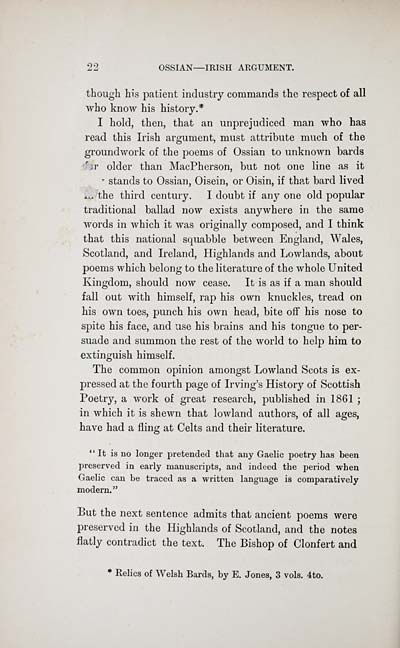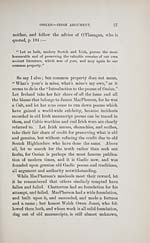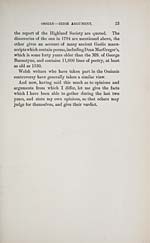Download files
Complete book:
Individual page:
Thumbnail gallery: Grid view | List view

22 OSSIAN — IRISH ARGUMENT.
though his patient industry commands the respect of all
who know his history.*
I hold, then, that an unprejudiced man who has
read this Irish argument, must attribute much of the
groundwork of the poems of Ossian to unknown bards
r ir older than MacPherson, but not one line as it
' stands to Ossian, Oisein, or Oisin, if that bard lived
*~ the third century. I doubt if any one old popular
traditional ballad now exists anywhere in the same
words in which it was originally composed, and I think
that this national squabble between England, Wales,
Scotland, and Ireland, Highlands and Lowlands, about
poems which belong to the literature of the whole United
Kingdom, should now cease. It is as if a man should
fall out with himself, rap his own knuckles, tread on
his own toes, punch his own head, bite off his nose to
spite his face, and use his brains and his tongue to per-
suade and summon the rest of the world to help him to
extinguish himself.
The common opinion amongst Lowland Scots is ex-
pressed at the fourth page of Irving's History of Scottish
Poetry, a work of great research, published in 1861 ;
in which it is shewn that lowland authors, of all ages,
have had a fling at Celts and their literature.
"It is no longer pretended that any Gaelic poetry has been
preserved in early manuscripts, and indeed the period when
Gaelic can be traced as a written language is comparatively
modern."
Put the next sentence admits that ancient poems were
preserved in the Highlands of Scotland, and the notes
flatly contradict the text. The Bishop of Clonfert and
* Relics of Welsh Bards, by E. Jones, 3 vols. 4to.
though his patient industry commands the respect of all
who know his history.*
I hold, then, that an unprejudiced man who has
read this Irish argument, must attribute much of the
groundwork of the poems of Ossian to unknown bards
r ir older than MacPherson, but not one line as it
' stands to Ossian, Oisein, or Oisin, if that bard lived
*~ the third century. I doubt if any one old popular
traditional ballad now exists anywhere in the same
words in which it was originally composed, and I think
that this national squabble between England, Wales,
Scotland, and Ireland, Highlands and Lowlands, about
poems which belong to the literature of the whole United
Kingdom, should now cease. It is as if a man should
fall out with himself, rap his own knuckles, tread on
his own toes, punch his own head, bite off his nose to
spite his face, and use his brains and his tongue to per-
suade and summon the rest of the world to help him to
extinguish himself.
The common opinion amongst Lowland Scots is ex-
pressed at the fourth page of Irving's History of Scottish
Poetry, a work of great research, published in 1861 ;
in which it is shewn that lowland authors, of all ages,
have had a fling at Celts and their literature.
"It is no longer pretended that any Gaelic poetry has been
preserved in early manuscripts, and indeed the period when
Gaelic can be traced as a written language is comparatively
modern."
Put the next sentence admits that ancient poems were
preserved in the Highlands of Scotland, and the notes
flatly contradict the text. The Bishop of Clonfert and
* Relics of Welsh Bards, by E. Jones, 3 vols. 4to.
Set display mode to: Large image | Transcription
Images and transcriptions on this page, including medium image downloads, may be used under the Creative Commons Attribution 4.0 International Licence unless otherwise stated. ![]()
| Early Gaelic Book Collections > Matheson Collection > Popular tales of the west Highlands > Volume 4 > (38) |
|---|
| Permanent URL | https://digital.nls.uk/81487513 |
|---|
| Description | Volume IV. |
|---|---|
| Shelfmark | Mat.77 |
| Additional NLS resources: | |
| Attribution and copyright: |
|
| Description | Items from a collection of 170 volumes relating to Gaelic matters. Mainly philological works in the Celtic and some non-Celtic languages. Some books extensively annotated by Angus Matheson, the first Professor of Celtic at Glasgow University. |
|---|
| Description | Selected items from five 'Special and Named Printed Collections'. Includes books in Gaelic and other Celtic languages, works about the Gaels, their languages, literature, culture and history. |
|---|

